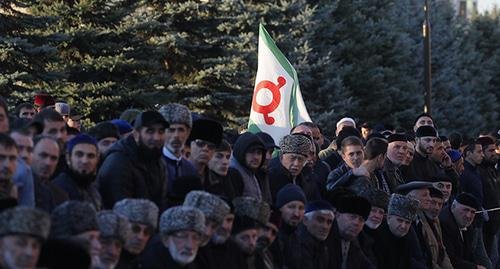In the case of the Ingush protest leaders, there is no evidence that violence against government officials; instead, there is evidence of attempts to keep the protest peaceful, Russian human rights activist Andrei Sabinin, a lawyer with the Agora International Human Rights Group and the «Zone of Rights «* organization, said on his Facebook page.
«The harsh punishment «added up» to two charges: organizing the use of violence against representatives of the authorities (law enforcement agencies) under Art. 318 of the Criminal Code and creation/participation in an extremist community under Art. 282.1 OF THE CRIMINAL CODE. The law itself allows for such terms and even more. The question is whether this punishment is related to the existence of the crimes. In our opinion, it has nothing to do with anything, because these corpus delicti do not exist, which is what the lawyers and the whole ‘Ingush seven’ were trying to prove,» he said.
Sabinin believes that those conflicts, as a result of which the law enforcement officers «suffered physical pain and moral damage,» are nothing but a multiplicity of separate and unrelated consolidated actions on the part of the rally participants.
«People defended themselves, got hot, responded with force against force. There was no agreed version of «violence,» and the qualification of the deeds of the seven is fundamentally flawed. It is impossible to organize collective violence, calling for its prevention and termination. Moreover, there have already been verdicts in which participants were found guilty of causing harm not dangerous to life, now the «organizers» are convicted of the qualified corpus delicti — organization of violence dangerous to life and health», — said the human rights activist.
The criminal case exposed the use of classified witnesses and even political witnesses whose interrogation in court confirmed the artificial nature of the charges, aimed solely at eliminating the active part of citizens of the republic who allowed themselves to oppose the authorities’ policy of reforming the referendum system and the behind-the-scenes seizure of historical territories, he added.
«To oppose and fight is not to fight, but without a small, quick and victorious attack by law enforcement, no one could be made enemies and outcasts, which is why this long-running investigative and prosecutorial performance happened. When he could not come to an agreement with his own people through democratic procedures, he was sent to the dungeons.
The charges of organizing and participating in an extremist group were «on the off-chance» that the Investigative Committee was leafing through the criminal code, looking for additional articles that could be charged, just to be sure. They found extremism. The trial, meanwhile, revealed an absolutely unique thing that you don’t often see in such an ideal version — the massive evidence of the prosecution … strangely proves the absence of corpus delicti, because this evidence destroys the prosecution itself,» Sabinin said.
The lawyer believes that the case is purely political, and is connected with the criminal law by such thin threads that even with a magnifying glass it is impossible to discern them. «Figuratively speaking, ‘when the cannons are talking, the muses are silent. So the muses were silenced, (they) were silenced,» stressed Sabinin.
A sensible and legitimate democratic process is ruined, and for a long time: the brave ones who dared to propose to society to enter into a dialogue with the authorities, very quickly ended up in prison, he noted.
«The constructed «extremist community» has not committed a single crime (and committing or preparing them is a necessary element), but it was persistently imposed by the events of March 27, 2019, which in May 2018 (according to the (version) of the prosecution the community was created just then) is not only impossible, but also beyond the limits of formal logic. The indictment and, to be sure, the verdict (we have not yet seen it) are built «from the backward» — from events that required a criminal legal response from the state, and then into this whirlwind were exclusively those that raised pressing issues of the socio-political agenda. What business is it in that case? Political. Will we be able to continue to cross such rivers? I don’t know…», summed up the human rights activist.
Recall that mass protests have been taking place in Ingushetia since the fall of 2018. The inhabitants of the republic opposed the agreement on the border with Chechnya. In March 2019, the rallies turned into clashes with security forces and detentions of activists. Most of those arrested in the aftermath of those events received real sentences on charges of violence against public officials.
Akhmed Barakhoev, Musa Malsagov, Ismail Nalgiev, Zarifa Sautieva, Malsag Uzhakhov, Bagaudin Khautiev and Barakh Chemurziev were charged with extremism. On December 15, the Kislovodsk city court sentenced them to terms from 7.5 to 9 years in prison. There is a separate trial for Akhmed Pogorov.
* The organization has been entered by the Russian Ministry of Justice into the register of non-profit organizations performing the functions of a foreign agent.
